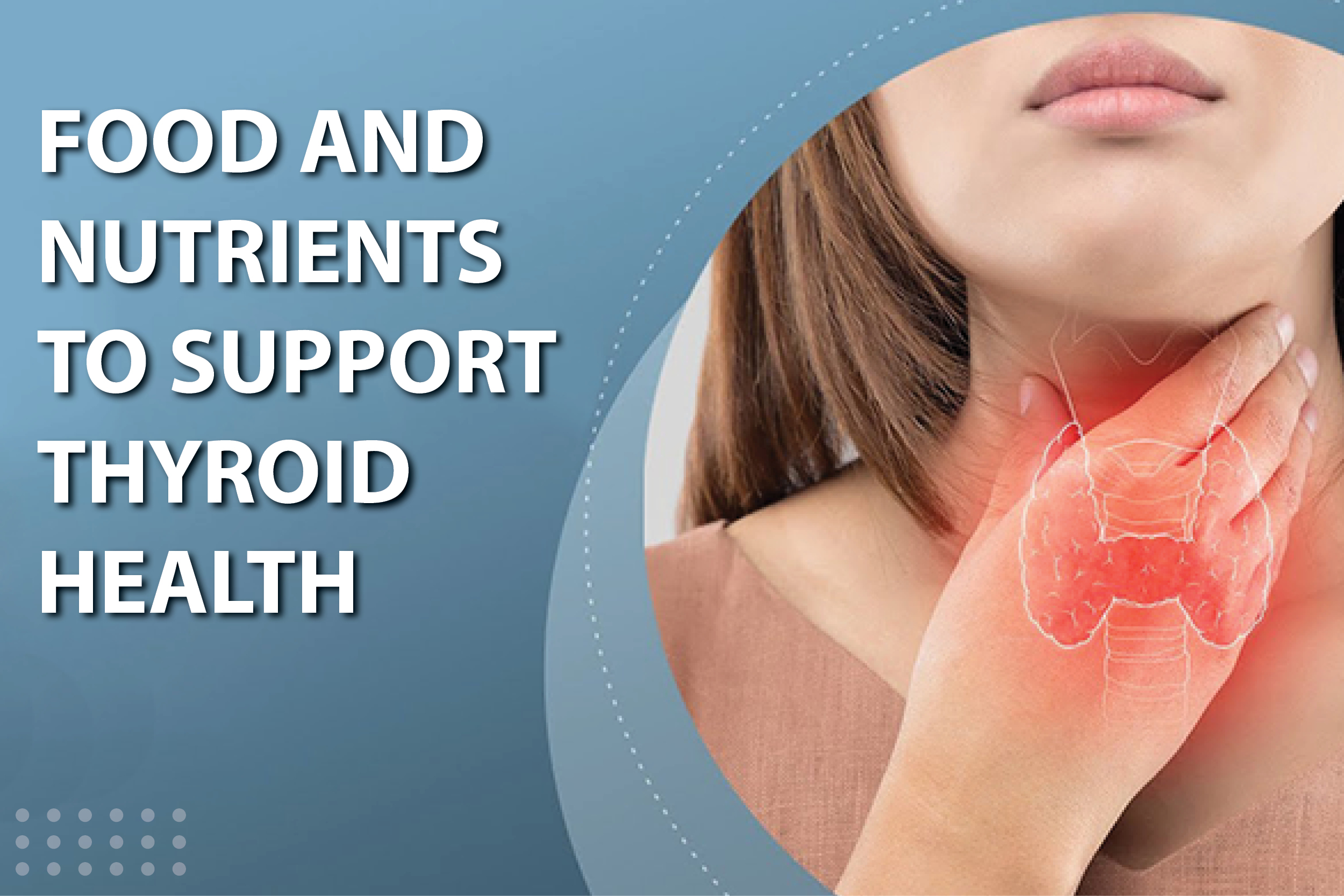Food and Nutrients to Support Thyroid
Each January marks Thyroid Awareness Month, a dedicated time to bring awareness to your thyroid. This small, yet mighty, butterfly-shaped gland plays a pivotal role in your body’s metabolism, growth, and development. Located in the front of your neck, the thyroid is a vital hormone gland in the endocrine system that helps to regulate many bodily functions by continuously releasing a steady amount of thyroid hormones into the bloodstream. There are various thyroid conditions and diseases that affect millions of Americans each year, many of which go undiagnosed. Thyroid issues can affect anyone, regardless of age or gender. However, women are more prone to thyroid disorders than men, and the risk increases with age. It’s important to know what signs and symptoms could be the cause of a potential thyroid problem or thyroid cancer, and what you can do to support your thyroid health.
When it comes to supporting your thyroid health through diet, it’s essential to incorporate foods that host key nutrients like iodine, selenium, zinc, omega-3s, and antioxidants, which all play a key role in thyroid hormone production. Iodine is an essential trace mineral not made by the body, which is why incorporating iodine-rich foods like seaweed, iodized salt, dairy, and fish, such as tuna and cod, can aid in maintaining proper thyroid function. Without enough iodine, your thyroid hormones struggle to function properly and can lead to hypothyroidism (underactive thyroid) or hyperthyroidism (overactive thyroid) with various negative side effects. It's important to ensure your body receives enough iodine, but not to consume too much, as overconsumption can also lead to thyroid issues. Take a look at these foods rich in iodine, selenium, zinc, omega-3s, and antioxidants to incorporate into your diet for optimal thyroid function:
Eggs
Pasture-raised eggs are a protein-forward option that house iodine, selenium, and vitamin D and B12.
Seaweed
Iodine is found in soil and the ocean, which varies in amount and will affect how much of the mineral is contained in a food. Sea vegetables like seaweed, specifically nori, kelp, kombu, and wakame are a rich source of iodine.
Leafy Greens
Leafy greens like broccoli, spinach, kale, dandelion greens, and other leafy greens are home to antioxidants like vitamins C and E, beta-carotene, calcium, and fiber.
Nuts and Seeds
Brazil nuts, pumpkin, and chia seeds are a rich selenium source.
Fish and Shellfish
Fish and shellfish like salmon, cod, canned tuna, oysters, shrimp, and sardines, are high in omega-3 fatty acids, zinc, iodine, and selenium.
Yogurt
Unsweetened, low-fat yogurt is a great source of iodine, protein, probiotics, and calcium.
Berries
Berries like blueberries, raspberries, blackberries, and strawberries are anti-inflammatory, antioxidant-packed, and high in vitamin C.
Legumes
Lentils, chickpeas, and various beans are protein-packed and consist of iron, zinc, and fiber.
Avocados
Avocados are a good source of healthy fats, fiber, and vitamins C, E, K, and B.
A balanced diet is key for optimal health and being conscious of consuming foods rich in iodine, selenium, zinc, omega-3s, and antioxidants can help you avoid thyroid issues and the associated symptoms. Some of the most common thyroid conditions and common symptoms to look out for are:
Hyperthyroidism
Hyperthyroidism is caused by an overactive thyroid gland that makes too much of the thyroid hormone (TH). The most common cause of hyperthyroidism is Grave’s disease. Hyperthyroidism symptoms include:
-
Restlessness
-
Rapid heartbeat
-
Increased sweating
-
Irritability
-
Anxiety and nervousness
-
Trouble sleeping
-
Thin skin
-
Brittle hair and nails
-
Weak muscles
-
Diarrhea
-
Weight loss
Hypothyroidism
Hypothyroidism is caused by an underactive thyroid that doesn’t produce enough TH, and the most common cause of hypothyroidism is Hashimoto’s thyroiditis. While most cases of hypothyroidism are mild, these are the symptoms to look for:
-
Fatigue
-
Weak muscles
-
Sensitivity to cold
-
Memory problems
-
Slower heart rate
-
Dry skin and hair
-
Constipation
-
Weight gain
Thyroid Nodules
Thyroid nodules are growths and lumps that form on or in the thyroid gland. These nodules can appear alone or in groups and are very common in people over age 60. It’s not clear why these nodules appear, but in most cases, they are harmless. Though they typically don’t cause symptoms, you may notice symptoms similar to hyperthyroidism if the nodules are leading to other problems:
-
A lump in the front of the lower neck
-
Neck pain
-
A hoarse voice
-
Trouble swallowing
-
A tickle in the throat
-
Difficulty breathing, especially when lying down
-
Jaw or ear pain
Thyroid Cancer
Thyroid cancer develops when the abnormal cells uncontrollably multiply to form a tumor on the thyroid gland. When caught early, thyroid cancer is one of the most treatable types of cancer. Here are the symptoms to look for:
-
Lump in your neck or throat
-
Neck or throat pain
-
Swollen lymph nodes in the neck and throat
-
Difficulty swallowing
-
Changes to your voice, including hoarseness
-
A persistent cough
Sources:
NIH: How does the thyroid gland work?
Harvard School of Public Health: Iodine
SS Journals: 8 Foods for Thyroid Health: Eating Your Way to a Happy Thyroid

